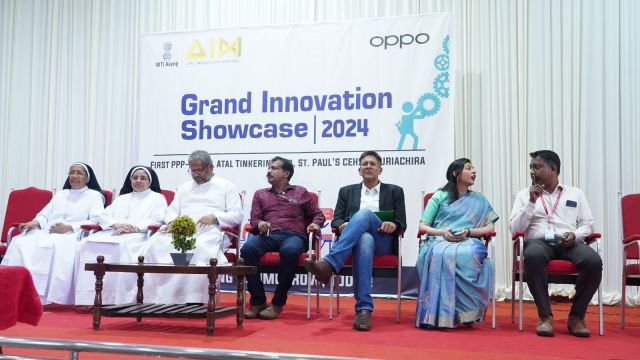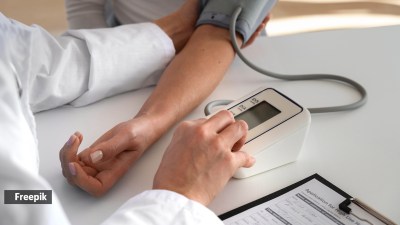NITI Aayog, Oppo celebrate anniversary of first private-public Atal Tinkering Lab in Kerala
The Atal Tinkering Lab at St. Paul's School in Kuriachira, Thrissur, Kerala, is the first one to operate on a public-private partnership model.
 From right to left, Biju Parameswaran, Program Consultant, Kerala Development and Innovation Strategic Council, Deepali Upadhyay, Program Directior, Atal Innovation Mission, NITI Aayog, Vivek Vasishtha, vice president, public affais, Oppo India. Thrissur District Education Officer Dr A Anzar, Vadakoot Thomas, parish priest and school faculty. (Oppo)
From right to left, Biju Parameswaran, Program Consultant, Kerala Development and Innovation Strategic Council, Deepali Upadhyay, Program Directior, Atal Innovation Mission, NITI Aayog, Vivek Vasishtha, vice president, public affais, Oppo India. Thrissur District Education Officer Dr A Anzar, Vadakoot Thomas, parish priest and school faculty. (Oppo)Indian government policy think tank NITI Aayog and Oppo India on Tuesday celebrated the first anniversary of the Atal Tinkering Laboratory (ATL) at St Paul’s CE Higher Secondary School in Kuriachira, Thrissur. This is the first ATL established under a public-private partnership and could potentially serve as a trailblazer for more such events across the country.
NITI Aayog’s Atal Innovation Mission (AIM) has already established more than 10,000 ATLs across as many schools in 35 states and union territories in the country, to develop skills like design philosophy, computational thinking, adaptive learning, physical computing, and more.
But, the ATL at St Paul’s is the first one to be established in partnership with a private company, Oppo India. The ATL was inaugurated in 2023 by Rajeev Chandrashekhar, the Minister of State for Skill Development and Entrepreneurship and Electronics and Information Technology.
Chandrasekhar is an alumnus of the school. The ATL at St. Paul’s functions with a “hub and spoke model,” where the school’s lab serves as a hub that can be used to train students from other nearby institutions.
Under the programme, every student from the hub school, St. Paul’s in this instance, gets 45 minutes every week where they spend time in the lab, being taught by a teacher appointed by Learner Links Foundation, an NGO. As many as 70 of the best students among them are chosen for a “Tinkerer’s club” that prepares for competitions and exhibitions like this.
The “Grand Student Innovation Showcase 2024” exhibited electronics, robotics, and coding-based projects developed by students over the previous year. More than 20 projects developed by students from three different schools were selected for the showcase and the top three projects among them were given a special award. This includes a smart farming system, a “caring robot” aimed at the really young and the really old, and “smart goggles” aimed at helping visually challenged individuals navigate their environment.
The event was attended by Deepali Upadhyay, programme director of the Atal Innovation Mission, NITI Aayog; Biju Parameswaran, programme consultant, Kerala Development and Innovation Strategic Council along with Dr A Anzar, the District Education Officer for Thrissur.
“Even when NITI Aayog themselves set up a lab, we are not able to give this kind of handholding and attention as we received through the Oppo team,” said Deepali Upadhyay in a speech thanking all the stakeholders.
 Two exhibits at the Grand Student Innovation Showcase 2024 in the ATL in Thrissur. (Oppo)
Two exhibits at the Grand Student Innovation Showcase 2024 in the ATL in Thrissur. (Oppo)
“I would like to thank Minister Rajeev Chandrasekhar, who first thought that such a thing could happen. We have to thank the state itself. We have the DEO (District Education Officer) with us. This is the kind of collaboration and partnership we talk of. It is a dream for us. We have a state department, the central ministry involved, a private partner, a minister, a foundation, and a school all working together. Such a powerful combination of all players,” added Upadhyay.
The winning tinkerers
The problem with school projects is that it is often difficult to understand how much the students contributed versus how much help they got from their guardians and teachers. While that may also be true here, when indianexpress.com visited the event, the students demonstrated impressive technical knowledge as well as an ambition to solve problems.
Vivek Vasishtha, Vice-President, Public Affairs, OPPO India, also visited ATL with indianexpress.com and was thoroughly impressed by the project, referring to how students studying in 6th grade and 9th grade are creating projects that an engineering college student would have been doing decades ago.
“I really want you to understand that all of you are privileged. What you are witnessing or experiencing is something few children in the country can,” he said during the event, encouraging children to take advantage of the ATL facilities given to them.
“You might think that a sixth grader would not be able to work with technology like this, but that is not true. If you start taking classes, you will understand that this is nothing for them. These children already have a lot of technical knowledge. They grasp technology much better than we give them credit for,” said Shaiju B, one of the two teachers at ATL, to indianexpress.com.
All twenty projects exhibited during the event displayed innovative thinking and sound technical knowledge. It would have been difficult to select just three among them but since that has already been done, here they are.
First place was grabbed by a Smart Farming System developed by 9th graders at St Paul’s. In response to recent human-wildlife conflicts like the famous Arikomban issues, Aswathy N G, Annliya Deepak, and Maria CJ developed a system that can safeguard crops against both wild animals and adverse weather events.
 The students who developed the smart farming system. (Oppo)
The students who developed the smart farming system. (Oppo)
The project used an Arduino UNO board along with ultrasonic sensors, servomotor, a buzzer, processing software, a soil moisture sensor, a relay module, and a water pump module to create a system aimed at safeguarding crops from both wildlife and unpredictable weather.
 The caring robot built by students at St. Paul’s won second place. (Oppo)
The caring robot built by students at St. Paul’s won second place. (Oppo)
Second place went to a “caring robot,” again developed by 9th graders at St Paul’s — Christy F Vattakuzhy, Daniel Christo K J, and Sreenandan CS. The robot is designed to act as a companion to the young and the old and uses gear motors and servo motors to provide entertainment with music, dance, and lights. The robot can be controlled using a mobile app.
 The smart goggles developed by students at St. Mary’s concent school in Thrissur. (Oppo)
The smart goggles developed by students at St. Mary’s concent school in Thrissur. (Oppo)
Third place went to “smart goggles” developed by 9th-grade students from St Mary’s Convent Girls Higher Secondary School, which is one of the “spoke” schools. Smart goggles are designed for visually impaired individuals and use an ultrasonic sensor to identify obstacles in front of them. It then triggers a buzzer when the object is at an unsafe distance.







